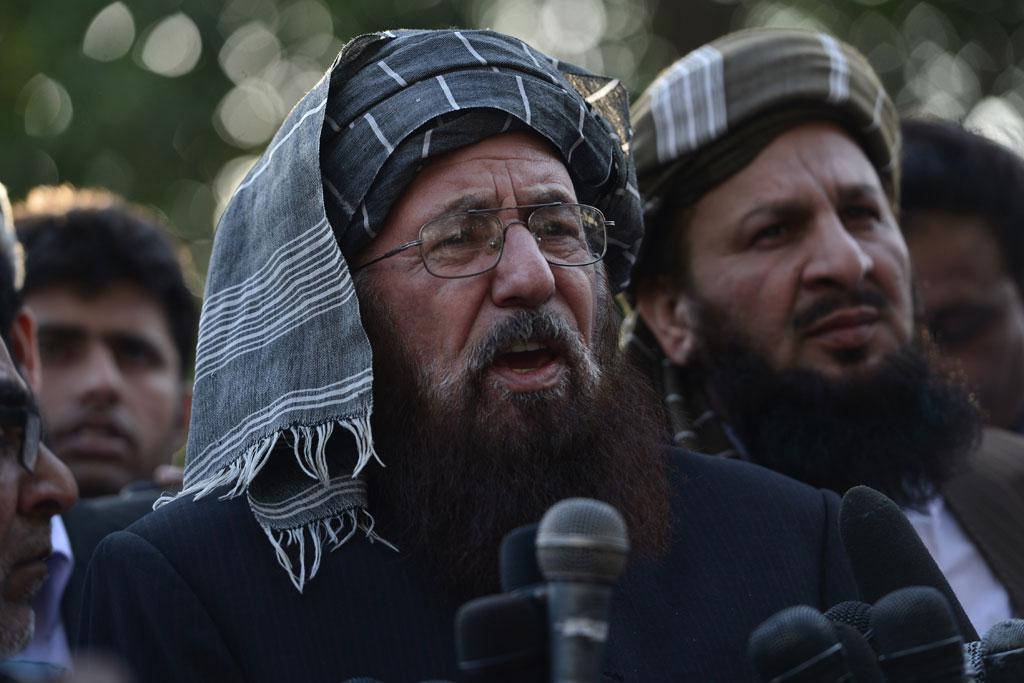Pakistan frees 16 prisoners in an attempt to revive peace talks with the Taliban
Maulana Sami ul Haq, a negotiator for the Tehreek-e-Taliban Pakistan (TTP) in peace talks with the Pakistan government, talks with media representative after a meeting of the negotiation committee in Islamabad on March 22, 2014.
Pakistan has freed at least 16 Taliban prisoners with the approval of Prime Minister Nawaz Sharif, government and intelligence officials said on Thursday, in a move designed to invigorate a shaky peace process with the militant group.
Sharif's office later released a statement saying those freed had been involved in petty crimes and were not Taliban prisoners, showing the sensitivity of releasing inmates who a public weary of violence might see as militants.
The Pakistani Taliban called a one-month ceasefire on March 1 but said this week they would not extend the truce because the government was not serious about meeting their demands.
The demands include releasing 800 prisoners the insurgent group describes as innocent family members and withdrawing the army from parts of the semi-autonomous tribal areas along the border with Afghanistan.
Sharif, who took power last year promising to strike a negotiated peace with the Taliban, has been trying to engage the militants, who want to topple his government and enforce severe Islamic law.
The political agent of South Waziristan, the highest government official in the northwestern tribal region, said the government had started releasing non-combatant prisoners to boost the reconciliation efforts.
"South Waziristan's political administration released 16 men on April 1," Islam Zeb told Reuters.
"They are not major commanders. They are innocent tribals linked to the Taliban and arrested during different search operations in South Waziristan in the last two to three years."
Zeb said all the released prisoners belonged to the Mehsud tribe, a major Pashtun tribe living in South Waziristan. Another 100 prisoners on the Taliban's list were being processed and would be released in the next few days, he added.
Taliban negotiators were not available to comment.
"The release of some prisoners involved in petty crimes by the political administration has been wrongly connoted as release of Taliban prisoners," Sharif's office said in its later statement.
Intelligence officials said the prisoners were taken to the Zari Noor army camp in Wana, the region's main town.
The enclave on the Afghan border was once the epicenter of a spreading Taliban insurgency and the site of a major military offensive in 2009 that displaced half a million people.
Security officials said once at Wana, the prisoners were handed over to office of the political agent, who then released them to the Taliban.
'Goodwill gesture'
A source in the prime minister's office said Nawaz Sharif personally authorized the releases — an apparent sign he is giving in to pressure from the Pakistan Taliban and resisting those in the military arguing for tougher military action against militant strongholds.
"But they (released prisoners) are all non-combatant civilians. They are not sensitive figures," the prime minister's aide said. "Maybe some of them are Taliban sympathizers but they are not commanders and have no role in the talks process."
"Releasing them will create goodwill and we hope they (Taliban) will reciprocate," he added.
A public relations officer at the Interior Ministry, Mujeeb Qadir, said "16 non-combatant Taliban prisoners" had been freed.
Until last week, the government had repeatedly insisted it had no non-combatant prisoners in its custody.
Pakistan's tribal areas are governed by colonial-era legislation known as the Frontier Crimes Regulation under which relatives, tribesmen and neighbors of suspects can be arrested and detained for months or years without trial.
The reconciliation talks broke down last month, when a Taliban wing operating in the Mohmand Pashtun tribal region said it had executed 23 soldiers in revenge for the killing of its fighters by the security forces.
Islamabad then refused to hold further talks until the Taliban announced a ceasefire on March 1.
The second round of peace talks now hangs in the balance after the Taliban said on Wednesday they would not extend the ceasefire and warned that attacks would begin again in Pakistan.
On Wednesday night, a bomb exploded near a bridge just 30 minutes before the convoy of former Pakistani president Pervez Musharraf, who is on trial for treason, passed by. The retired general was not harmed.
Last month, a judge was among 11 people killed in a rare attack by a militant group calling itself Ahrar-ul-Hind on a court in Islamabad.
Pakistan's powerful military, which has the upper hand in policy-making and a free hand on internal security, has always been skeptical about talks.
A senior army official said the release of Taliban prisoners involved in attacks on civilians and the army was "impossible."
"There is no way these hardened militants will be freed," said the official who declined to be identified.
"Neither will the army pull out of the tribal areas. What are the Taliban asking: that we hand them parts of the country? That's not going to happen. No chance."
(Additional reporting by Syed Raza Hassan in Islamabad, Saud Mehsud in Karachi and Jibran Ahmed in Peshawar; Editing by Alison Williams)
Every day, reporters and producers at The World are hard at work bringing you human-centered news from across the globe. But we can’t do it without you. We need your support to ensure we can continue this work for another year.
Make a gift today, and you’ll help us unlock a matching gift of $67,000!
